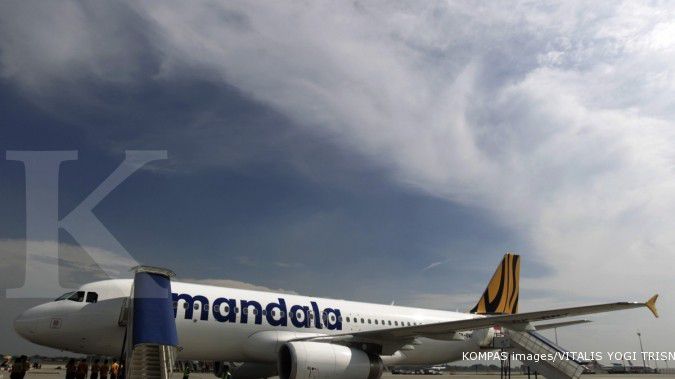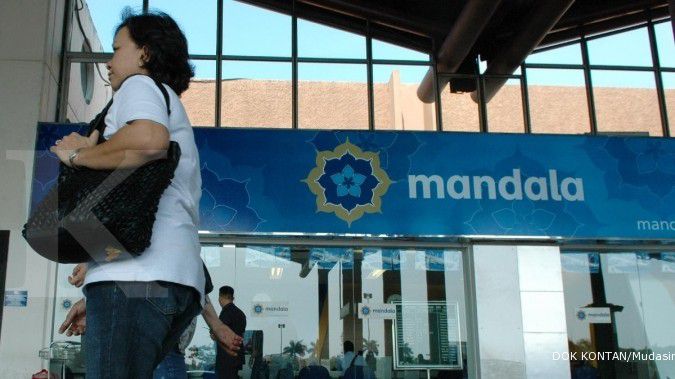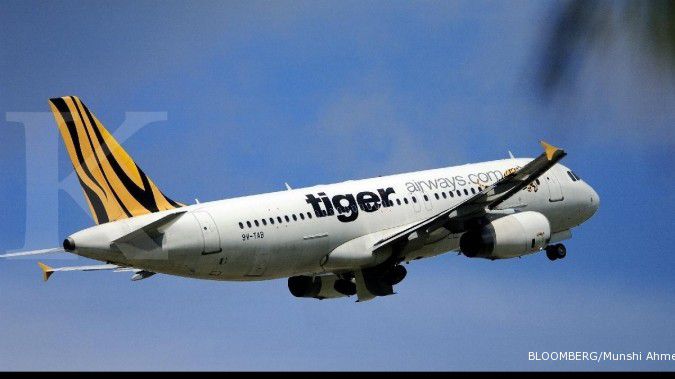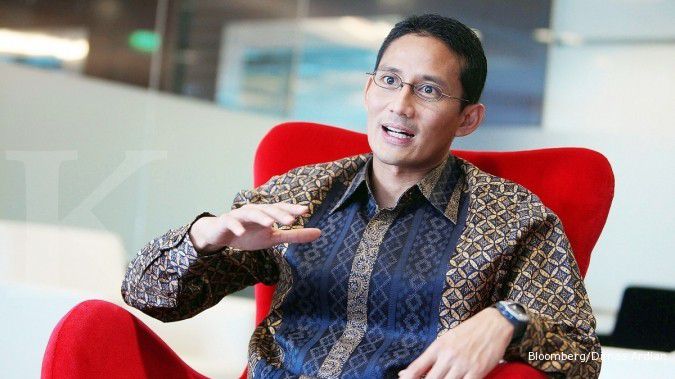JAKARTA. Loss-making budget carrier PT Mandala Airlines, which operates under the brand Tigerair Mandala, says it has decided to cease its operations as of July 1 after battling to keep its business alive.
The chairman of Mandala’s board of commissioners, Jusman Syafii Djamal, said in a statement on Wednesday that his firm was no longer able to beat pressure in the country’s competitive aviation industry as well as surging operational costs.
“We have looked at every angle to make this work, and have also discussed with other potential strategic and financial investors. In addition to the overcapacity situation that has put significant pressure on yields, the weakening rupiah, which has depreciated more than 20 percent since the beginning of 2013, has also increased operating costs significantly,” he said.
Mandala has twice failed with restructuring programs.
Mandala is 64.2 percent owned by equity firm Saratoga Capital — which was cofounded by Sandiaga Uno and Edwin Soeryadjaya — along with PT Cardig International, and 35.8 percent by the Singapore-based Tigerair Group.
The airline shut down its operations in January 2011 after it was grounded by heavy debt.
It made a comeback in April 2012 by rebranding itself as Tigerair Mandala, after completing a financial restructure that saw Tigerair become a key investor with a 33 percent stake.
In February, the firm even cut 11 routes to reduce its operational costs.
Tigerair Mandala senior communications executive Thoriq Husein said Mandala would provide severance packages for all its 291 staff members and that all passengers who had bought tickets for flights after July 1 would be transferred to Tiger Airways flights or have their ticket costs refunded.
The Malaysia-based CIMB Group previously predicted that Mandala would suffer US$24 million to $28 million of losses in its 2014 and 2015 fiscal years, while Mandala’s losses would also cause Tigerair to suffer between $8 million and $9 million in losses.
“Mandala’s financial results reflect the challenges that it is facing in the difficult operating environment,” Tigerair CEO Lee Lik Hsin said in a statement to the Singapore Stock Exchange.
Indonesia’s low-cost airline industry has become increasingly competitive, with a growing number of low-cost carriers and a larger market.
The Transportation Ministry estimates that the number of air travelers in the country will hit more than 100 million this year, 11 percent up from last year’s 93.56 million.
Lion Air, AirAsia Indonesia and Citilink are among the top budget carriers that the country’s air travelers opt for.
Acting director of air transportation at the Transportation Ministry, Santoso Eddy Wibowo, said the free market competition had always brought consequences, including operational shutdowns.
“We are sorry for what has happened to Mandala, but it is part of a free market,” he said.
Eddy said that his ministry would give a 30-day grace period from the time Mandala ceased its operations before it started offering Mandala’s routes to other airlines.
Indonesian National Air Carriers Association (INACA) chief Arif Wibowo said that what happened to Mandala very much reflected the country’s current macroeconomic conditions.
“I think the weakening of the rupiah, the surging cost of avtur [aviation turbine fuel] and the declining gross domestic product [GDP] growth have become the main factors affecting Mandala’s performance,” he said.
Arif said that what happened to Mandala should be a lesson for other low-cost carriers in the country.
He said that many airlines had to deal with surging operational costs, as well as the need to expand their fleets and routes, while the ticket-price ceiling had remained the same since 2010.
Arif said he expected that the government would help the aviation industry by accelerating the discussion to increase the ticket-price ceiling, as well as reducing import taxes on spare parts and improving infrastructure. (Khoirul Amin)
Mandala gives up hope and shut down operations
June 19, 2014, 03.33 PM
/2013/03/14/1558891645.jpg)
ILUSTRASI. Petugas menunjukkan emas di gerai Galeri 24 Pegadaian, Jakarta. KONTAN/Fransiskus Simbolon
Source: The Jakarta Post
| Editor: Hendra Gunawan
Latest News
-
February 24, 2026, 03.38 PM
Eni to Reach Final Investment Decision for Indonesia Gas Projects Next Month
-
February 24, 2026, 01.00 PM
Asia Stocks Try to Steady after Wall Street Selloff Sims Mood
-
February 23, 2026, 04.50 PM
Wall Street Futures and Dollar Slide on Trump Tariff Tumult
-
February 23, 2026, 02.17 PM
Indonesia's Government Spending Jumps 26% in January 2026
-
February 23, 2026, 01.47 PM
Indonesia's Government Spending Jumps 26% in January
-
February 21, 2026, 06.00 AM
Indonesia's Pertamina to Maintain Bidding Process for US Energy Imports
-
February 20, 2026, 01.23 PM
Indonesia Secures 19% Tariff Deal with US, Palm Oil and Other Commodities Exempt
-
February 20, 2026, 08.33 AM
Indonesia, US Sign Agreement on Reciprocal Trade, Indonesian Ministry Says
-
February 19, 2026, 08.12 AM
Indonesia, Freeport Units Sign MoU to Extend Mining Permit beyond 2041













